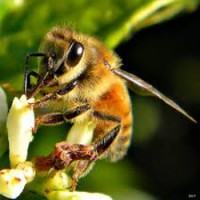Organic farming helps protect bees
Organic farming practices are effective in maintaining the health and population of bees and other important crop pollinators, according to a report released by The Organic Center.
Titled "The Role of Organic in Supporting Pollinator Health," the report reviewed 71 studies detailing current threats to our pollinators and the impact of organic practices. It found that organic methods not only reduce risks to bees, which have been declining at an alarming rate the past decade, but actively support the growth and health of populations of bees and other pollinators. The paper outlines pollinator-friendly techniques used by organic farmers that can also be incorporated into conventional farming systems.
"Our paper takes an in-depth look at the challenges faced by honey bees and other pollinators, and we look at organic as a model for supporting pollinator populations," said Dr. Jessica Shade, Director of Science Programs for The Organic Center. "We hope this report acts as a tool to educate policymakers, growers and consumers. Bee-friendly practices being used by organic farmers can be adopted by all producers to foster healthy pollinators."
Seventy-five percent of all crops grown for food rely on pollinators, mostly honey bees, for a successful harvest. But over the past decade, the bee population has plummeted. Since 2006, beekeepers have lost over a third of their bee hives. More than $16 billion worth of crops in the United States alone benefit from pollination every year. Without pollination from honey bees, many favorite fruits and vegetables such as apples, berries, carrots and onions would not be on our grocery shelves.
The Center's report notes that no one factor has been consistently singled out as the cause of the disproportionate bee declines. Instead, a number of factors – including exposure to toxic pesticides, parasite and pathogen infections, poor nutrition and loss of habitat – likely interact together, resulting in lethal consequences for bees. Large-scale chemically intensive agricultural production has been implicated as a major source of the threats to pollinators.
Organic as the solution
Organic farming, because of the practices it follows, has been demonstrated by a number of studies to support more pollinators than conventional farming.
"One of the simplest ways to conserve our pollinator populations in an agriculturally reliant world is through organic farming. Consumers can rest assured that every time they purchase an organic product, they are supporting pollinator health," said Shade.
Organic practices have been found to protect and support the health of bees in two critical ways:
- Less exposure to toxic chemicals. One of the biggest threats to bee health is exposure to toxic chemical pesticides through insecticides, herbicides, fungicides and other synthetic toxins used in industrial agriculture. Neonicotinoids, a widely used class of insecticides, are found by many studies to be especially harmful to bees. Neonicotinoids can be applied not only as a spray, which is toxic to all insects, but also as a seed coating. When seeds are treated with neonicotinoids, the toxin then transfers into plant tissue and is present in the plant's nectar and sap, which bees feed on. Organic farming standards largely prohibit organic farmers from using synthetic pesticides and require them to use integrated pest management (IPM) techniques instead of relying solely on pesticides.
- Protection of the bee's native habitat and biodiversity. Lack of habitat and nutritional food sources are key factors in pollinator decline. Bees need a diversity of plants from which to collect sufficient pollen and nectar to support their hives. Because organic producers are required to manage their farms in a way that maintains and improves natural resources, organic farms tend to have a more diverse landscape with more flowering plants to support and feed bees.
"Organic farming supports all of agriculture by maintaining and nourishing healthier pollinator communities, through practices such as crop rotations, hedgerow planting and the use of integrated pest management techniques. Our goal is to gain recognition for these important organic practices," said Shade.
The Organic Center's report follows the recent release from the White House of its official strategy to protect bees and other pollinators. The White House strategy provides funding to protect bee habitat, increase research, and directs the Environmental Protection Agency to re-evaluate neonicotinoids.
For the full report, go to https://www.organic-center.org/publications/the-role-of-organic-in-supporting-pollinator-health/.
The Organic Center's mission is to convene credible, evidence-based science on the health and environmental benefits of organic food and farming, and to communicate the findings to the public. As an independent non-profit 501(c)(3) research and education organization operating under the administrative auherespices of the Organic Trade Association, The Center envisions improved health for the environment and for people through the conversion of agriculture to organic methods.

